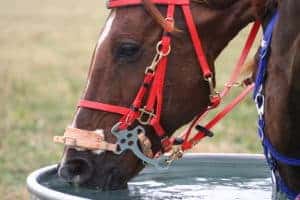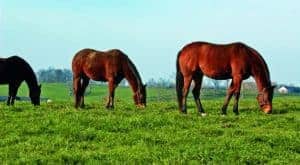
Broodmares’ Nutritional Needs During Late Gestation
A pregnant mare should maintain a healthy weight to support both the fetus’ and her own calorie needs.

A pregnant mare should maintain a healthy weight to support both the fetus’ and her own calorie needs.

Ensure your senior horse or pony is prepared for a healthy and happy year ahead.

The 3 equine forms of this neuromuscular disease are found in many areas of North America.

Techniques that allow researchers to understand the underlying mechanisms of disease include genetic analyses, RNA sequencing, and advanced proteomics and lipidomics.

Disease control focuses on prevention through increased biosecurity protocols.

University of Kentucky researchers reviewed 11 cases of this rare disease submitted to their lab from 2010 to 2021.

The most common horse vertebral issues seen over a decade at one diagnostic lab were wobbler syndrome, fracture/subluxation, and abnormal spinal curvature.

Learn about exhausted horse syndrome, its clinical signs and causes, and how to prevent and treat it.

The researcher replaces Dr. Peter Timoney, recently retired professor and Lennep Chair in Equine Veterinary Science at the University of Kentucky’s Gluck Center.

Warm, wet winter weather could lead to higher ergovaline concentrations in pastures, putting broodmares at risk for fescue toxicosis.

Mud in horse turnouts can create topsoil erosion, increase soil compaction, and cause slip-and-fall injuries to horses. Here are options to reduce mud on your horse property.

A researcher who specializes in aging equines offers nutrition, dental care, parasite control, vaccination, exercise, and health monitoring for seniors.

Are you ready to help your horse if water rises during a storm? A senior meteorologist from the University of Kentucky offers advice.

The workshop will be in-person and also livestreamed for virtual attendance. It is free to attend.

Buttercups can cause mouth pain and blisters, drooling, oral and gastric ulcers, colic, and diarrhea in horses that eat them.

Mares in good body condition have a reservoir of stored fat that can be used during cold winter weather.
Stay on top of the most recent Horse Health news with
© 2022 Copyright Statement dolor sit amet, consetetur sadipscing User Terms, sed diam nonumy eirmod tempor invidunt ut labore et dolore magna aliquyam erat, sed diam voluptua. At vero eos et accusam et justo duo dolores et ea rebum. Stet clita kasd gubergren, no sea takimata sanctus est Lorem ipsum dolor sit amet.